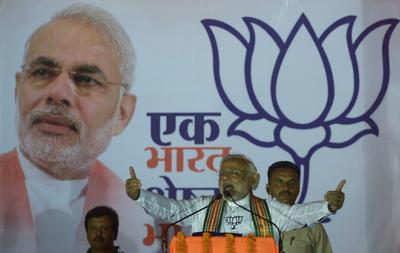For over a decade, Gujarat has hosted international summits, such as the Vibrant Gujarat Global Investors Summit, which have attracted diplomats and businessmen from Asia, Europe and Canada. Modi has also led delegations to China and Japan.
Yet concerns have been raised over his occasional anti-Pakistan rhetoric, such as when he accused the UPA Government of being soft on Pakistan. Modi’s most common attack on the UPA within this context is of ‘biryani diplomacy’, which refers to the serving of biryani to a visiting Pakistani PM, Raja Pervez Ashraf, in the immediate aftermath of the beheading of Indian soldiers in January 2013.
Still, if Modi becomes prime minister there are other factors which will help to ensure that his foreign policy is both nuanced and measured. In the context of the US, India’s business community and the influential Gujarati diaspora in the US will push for stronger relations between New Delhi and Washington. The US has already begun to reach out to Modi. A substantial number of American businesses have invested in his home state, and Congressional delegations have met with Modi.
In the context of Pakistan, Modi will find it difficult to ignore members of the business community and, more importantly, states such as Rajasthan and Punjab who want better trade and commercial ties with the country. Rajasthan is currently controlled by the BJP, while the Shiromani Akali Dal, a BJP ally, leads Punjab. Apart from Rajasthan and Punjab, business lobbies and the Chamber of Commerce and Industry within Modi’s home state of Gujarat has been lobbying for an overland trade route and closer ties with Karachi. A number of Pakistani delegations have also visited Gujarat, and invited Modi to visit Karachi.
As far as China is concerned, Modi already has cultivated business links with China — having visited the country in 2011. Although he has criticised the United Progressive Alliance for being weak on China on security issues, he has not opposed closer economic ties. Modi’s policy with respect to South East Asia is equally unlikely to be controversial: good relations with countries like Vietnam, Indonesia and Singapore are important not only economically but also to counter China’s growing influence in the region.
Yet there are a number of grey areas in Modi’s foreign policy vision.
First, Modi’s discourse with respect to Pakistan and other countries in the neighbourhood, such as Bangladesh, is purely security-driven. He often adopts divisive rhetoric on Bangladeshi immigrants but has not once spoken about the potential benefits, trade or otherwise, of strengthening ties with the country. States on the Bangladeshi border such as Tripura are keen to improve ties with Dhaka as it will benefit them economically. But, unlike states on the border of Pakistan, they do not wield much political influence. Modi’s job will be to understand the distinct priorities of different states.
Second, while the BJP has been successful in allying with various regional parties, some of these alliances are likely to create complications when it comes to foreign policy. One of the BJP’s allies in the state of Tamil Nadu, the Marumalarchi Dravida Munnetra Kazhagam (MDMK), has made some controversial demands in its manifesto. Apart from calling for a lift on the ban on the Liberation Tigers of Tamil Eelam, which could affect ties with Sri Lanka, the MDMK has also spoken in favour of the Sethusamudram Shipping Canal Project, which the BJP opposes.
Third, while Modi’s economics-driven approach toward foreign policy has its merits, he will need to ensure closer cooperation and coordination not just between the Ministry of External Affairs and the Ministry of Commerce, but also between the central government and state governments.
Finally, while the idea of granting a greater role to states in foreign policy is laudable, doing so will require a deeper change in the mindsets of the foreign policy mandarins in New Delhi. This will not happen overnight.
Despite the numerous question marks surrounding Modi’s foreign policy, one thing is certain: whoever wins the prime ministership will not face an easy task. While Modi has been successful in promoting economic diplomacy in his role as Chief Minister of Gujarat, the foreign policy of an entire country cannot be solely dictated by economic concerns. By the same token, Modi’s securitisation of neighbouring countries is equally troubling because it ignores the potential benefits of promoting greater economic integration.
Tridivesh Singh Maini is a New Delhi based columnist and a Visiting Fellow at The Jindal School of International Affairs, Sonepat.

